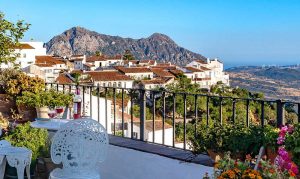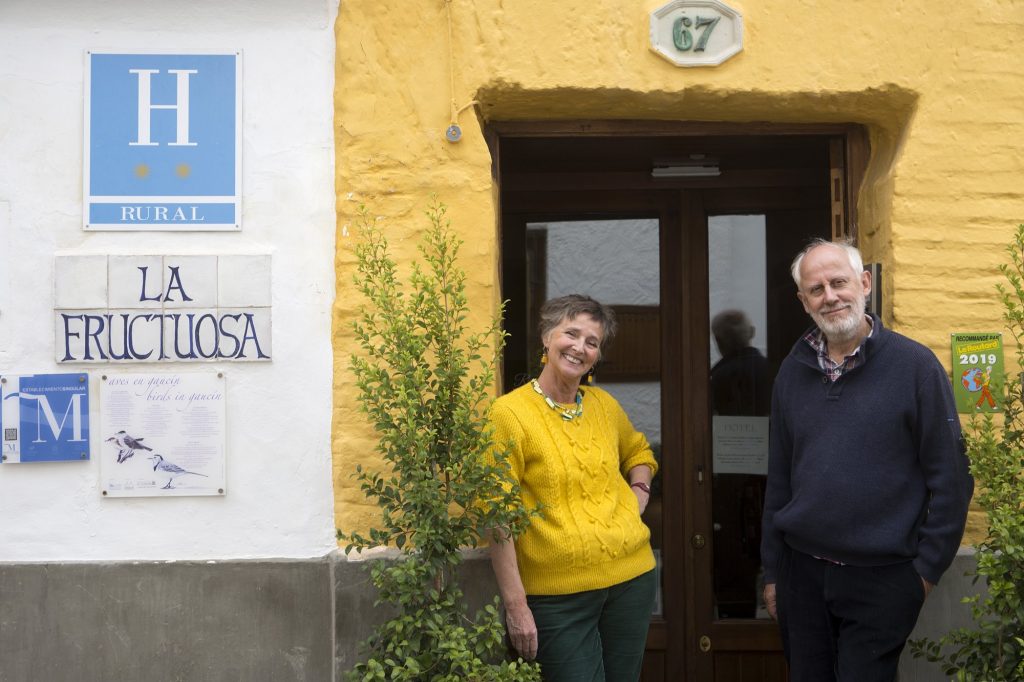The owners of an art boutique hotel in the beautiful white village of Gaucin, perched high up in the Serrania de Ronda have called for a boycott of OTAs (Online Travel Agency) including Booking.com, Hotel.com and Expedia saying the COVID-19 crisis ‘has revealed the true nature of OTAs’.
The independent Hotel La Fructuosa enjoys some of the ‘best views in Europe’ according to the Sunday Times but is currently closed due to the worldwide COVID-19 coronavirus pandemic in accordance with Spanish government regulations.

Under the management of Catherine Hunter and Daniel Beauvoir the six-bedroom hotel and restaurant La Fructuosa has earned many industry awards and recognition from their guests.
But they’ve had enough of the OTAs and are now calling on their guests to book direct with them.
The couple claim that “the COVID-19 crisis has revealed the true nature of OTAs.
“They changed their contractual terms as the pandemic unfolded, to the detriment of those they called their “partners”, the hoteliers and, in many cases, increased the risk of bankruptcy for many small independent establishments.”
Speaking exclusively to Secret Serrania this morning they said, “Now is the right time to get rid of the parasites. We have to rebuild from scratch: no need to go fast but to do it well.”
The couple said, “As a small independent hotel, we often think that we are dependent on OTAs (Online Travel Agency). Travellers, our customers, do not always know what an OTA is and yet they all know their brands: booking.com, Expedia, Hotel.com, etc.
“These intermediaries have established themselves over the past decade and many travellers use them to book their hotel stays.
“The consequences of these indirect reservations are:
They continue, “Hoteliers have two possibilities: either sell the rooms via OTAs at a higher price than what they charge “directly” or increase all their prices in order to absorb the costs entailed by the commissions payable to OTAs.
“The OTAs first tried to contractually prevent hoteliers from selling their rooms “directly” at a lower price than advertised on their site. These so-called leonine clauses are illegal, were challenged in court and several court decisions were taken against the OTAs.
“Then, the OTAs put algorithms in place comparing the prices practiced directly by the hoteliers with the prices on their websites and “punished” the recalcitrant hoteliers by reducing their visibility on their sites.
“OTAs invest large sums of money on search engines like Google to make sure that if a traveller searches for e.g. “Florence hotels”, their websites will appear first. Even if you know the name of the hotel and you are looking for, for example: “Hotel les Escondus à Vars” it is first the booking.com website which appears, even that of another OTA, and only after, the official website of the hotel.
The couple claim, “These parasitic practices have diverted billions to their profit, to the cost of both travellers and hoteliers.
“The COVID-19 crisis has revealed the true nature of OTAs. They changed their contractual terms as the pandemic unfolded, to the detriment of those they called their “partners”, the hoteliers and, in many cases, increased the risk of bankruptcy for many small independent establishments.
“This long period of closure of our establishments was a period to reflect on the way we work and to define how we will work in the future.
“Regarding our hotel, we have decided to stop working with OTAs. They prevent having direct contact with our customers: all emails sent by the customer or by the hotel “pass” through the OTA servers so that they can control the email exchanges between hotels and hosts.
“From now on, to reserve a room at La Fructuosa, our guests will have to contact us directly and I will do everything I can to share my call for a boycott of these parasitic platforms and, I hope, to be followed by a maximum of other hoteliers and owners of guesthouses.
“The world “after” is not doomed to be just a copy of the world “before”, with all its flaws.”

Málaga (España) Gaucín 02/12/2019 Reportaje en el Hotel La Fructuosa de la localidad de Gaucín. Los propietarios Daniel Beauvoir y Catherine Hunter (artists). Foto: Daniel Pérez
Comments are closed.

I completely agree! I have a small vivienda rural in the Guadiaro Valley and it is so frustrating to feel that we are so dependent on OTAs like Booking.com for our business. They take the lion’s share of space on the internet and appear at the top of every search for accommodation. Guests perhaps don’t realise that the commissions they charge are so high and the impact that has on the prices that we charge. Thank you for this article; I’m definitely going to work more on direct bookings!
How have the OTAs changed their terms since the lockdown? I don’t think that is clear from the article and yet an important point. Peter